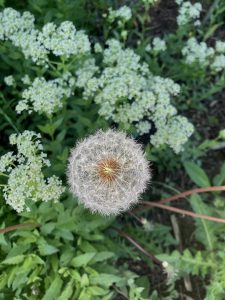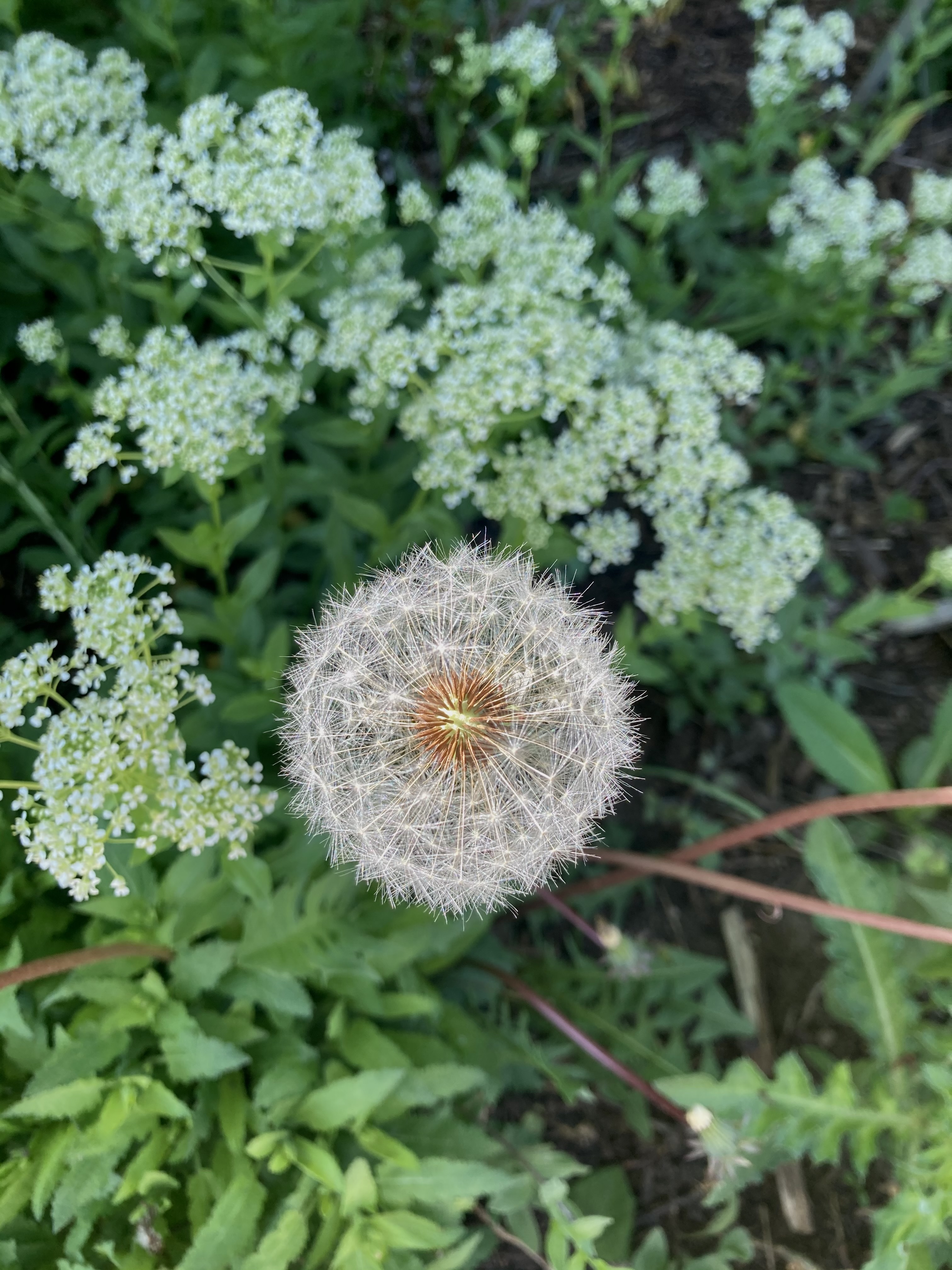Remove the bad to make room for the good
Weeding is a critical part of gardening, just like it is in cultivating a compassionate child. Weeds in a garden choke out the plants, robbing them of needed nutrients to grow healthy and produce delicious and nutritious fruits, vegetables, gorgeous flowers. Weeds can also choke out the good things in a child’s life.

What is a weed? Some say it is how you perceive it whether it is a weed or not. According to Merriam-Webster dictionary, a weed is a plant that is not valued where it is growing. Weeds aren’t always prickly, pokey and ugly. In fact, there are many weeds that I think are beautiful.
What are the weeds in a child’s life? Going with the definition above, I would classify weeds to include traits, characteristics behaviors, and attitudes that are not valued, and a distraction to those that are desired.
Weeds include violence, hatred, and selfishness. These are toxic weeds that can proliferate and get out of control. We want instead growth in love, compassion, kindness, and respect. Respect can be for a multitude of things including respect for nature, and respect for those in authority whether parents, teachers, police, government, those that serve and protect us, our nation, and the elderly.
Learning from history and respecting tradition can help prevent old weeds from spreading. Why repeat the same mistakes? Remember the past. Honor and hold traditions that are part of our heritage or practice. Traditions are our foundations, the root of our souls. Hold on to the healthy roots and remove those that are weeds. I am moved to tears when I hear a bugle play Taps. It conjures up the past, our heritage, and all those that who sacrificed their lives to help make this world a better place for you and me.
We all, including little children, are exposed to violence every day. Violence is a weed. Violence is a reaction to many feelings from frustration, selfishness, anger, injustice, and greed. When I attended elementary school, we had fire and tornado drills a few times a year to know what to do, where to go and how to protect ourselves as best as possible. Never in my wildest nightmares would I think that today, in modern society, our children would be practicing what to do if there is a shooting in their school! What has happened to society? It seems backward. How did we allow this weed to get so out of control?
Hatred and selfishness can consume a person. How do these weeds grow and manifest? Some people have come from difficult beginnings, some have mental health issues, and some are influenced by the other people and negative happenings in society. Pluck out those weeds, nurture and demonstrate being a kind and compassionate person. Let these positive seeds blow in the wind, proliferate and set root in our society.
Distractions can be a weed. There are constant distractions in today’s world. We are bombarded with an overwhelming amount of information from advertising, news in the world, and social events happening from our own circle of friends to those happening around the globe. We have easy access to it all. Too much information can be a distraction. Distractions are a diversion, and disruption from focusing on the fruit and flowers we want to nourish.
But are there weeds in life that someone else might consider a flower? Since I consider distractions a weed, the answer would be yes, not everyone sees the same plant the same way. There are some things one person might consider a distraction whereas for someone else, it is not. What makes a weed a weed? A different perspective is what Ralph Waldo Emerson is credited with in describing a weed as “a plant whose virtues have not yet been discovered.”
There might be a situation where your child is not excelling in the math and sciences, and you feel she is distracted by her interests in music and the arts. But maybe music and arts are not the distraction but instead, your desire to have her pursue math and sciences is instead.
One children’s book I wrote is called, I’m Not A Weed. It is about acceptance and welcoming, especially unplanned events. Suzy Sunflower blows into a perennial garden and therefore considered a weed by the gardener. But to the gardener’s wife, Suzy is not a weed but a ray of sunshine that makes her happy to see each morning.
Sometimes we need to open our minds to different perspectives, different views, to fully understand. In the book mentioned above, Serina and Seymour Seed, who are seeds of compassion, look through a magnifying class to see things better. Seeing through the magnifying glass they get a bigger view, a different perspective. A person may be happy and smiling on the outside, or posting in social media about their wonderful life, when, this person may be dealing with hardships, disappointments, and sadness, in the background, like most of us do at times.

Feeding on what creates a weed, sometimes these false perceptions can create insecurity and selfishness. We think someone else has it better than us. Those ugly weeds crop up. We may see someone getting first place in the track meet or scoring their first soccer goal. What we don’t see is the work and effort behind those achievements. And yes, some people are just fortunate to be born with natural talents! But we also don’t see the child who may have been born with disabilities and that taking their first step at age 3 is a major accomplishment. Life is not fair. Have your child compete against themselves to improve and find their special purpose in life.
If there is a winner in something there is also a loser. To make everyone a winner discounts the one who does excel in something. Find the strengths your child has, their fruit or flower, and appreciate the strengths and beauty in others. It’s a good thing we have different interests and strengths in this world.
Acknowledge the good in people and don’t let a weed be all consuming. No one is perfect. Think of little Jimmy who is a terror at school. But on the soccer field he excels. He is strong, works hard, is athletic, and a team player. Acknowledge the good in Jimmy. By acknowledging the good in him doesn’t mean we like his behavior at school. Jimmy is human like we all are. Emphasize, acknowledge, and encourage the good in people. Address and weed out the bad. Don’t pull out the entire plant or whole garden because there is a weed or weeds!
My oldest daughter visited Kenya one summer. She was amazed at the poverty there and how little the children had as far as food, clothes, and material goods. It seems unfair that they should have so little when we in other countries have so much. But what was even more shocking to her, is that these children were not unhappy. In fact, they had smiles on their faces and seemed incredibly happy. Again, teach children that things will not be perceived as fair in life and never will be.
What are other weeds? Look at your child’s life. Is it balanced? Are they eating healthy food and drinks and including movement into their lives? Unhealthy drinks and food are a pesky weed that so easily springs up.
Are they exercising their mind and continually learning? What about their emotional and spiritual lives? Do you talk to them about their day and how they are feeling? Are they connected to a higher power? Principles and morals are what establish a healthy and rich soil where positive virtues can grow. How are your child’s principles and morals established? Are they rooted from the bible and the ten commandments, where it states, you should not kill, you should not steal, you should not covet, to list a few? How are non-Christian’s morals, principles, and foundation established. Do humans have a natural right and wrong barometer? Is your child’s barometer at the right setting?
Little children will make mistakes. Weeds will pop up. That is part of life. But don’t ignore the weeds. Address them, whether removing or controlling them. Likewise, the world makes mistakes. Acknowledge it. Learn from it. Correct it and move forward. The children of today will grow up to be the leaders of the world. Teach them right.
By pulling weeds when they’re small, they’re not only simpler to remove, but they also don’t get a chance to bloom and go to seed, which significantly increases weed problems. The bigger weeds can also be difficult to pull out and are often prickly. Similarly, address the weeds when your child is small. It is much easier than when weeds have been strongly rooted in them. Instill in them seeds of compassion and let them bloom, go to seed, and proliferate instead. Let the good practices become habit.
Pulling out weeds is not easy. It takes work and getting our hands dirty. Managing the weeds in our children’s lives is not always easy either. There may be arguments, deep discussions, tears, anger, and frustration as your child grows through the weeds of life. And weeding it once doesn’t mean they are gone forever; it helps manage them and gets them under control.
The best way to dig up weeds is to wait until after a rain, when the soil is still wet and soft enough to pull the weeds. I relate this to a child who is dealing with a weed in their life that hasn’t been managed in the past. Ideally, you want to avoid the low points in life by proactively addressing the weeds. But it will happen, and you will find your child in wet tears. Sometimes you may find that this is the easiest time to manage the weeds when they are at their lowest point. Like the wet soil, they are more pliable and willing to listen, and inclined to change if need be.
Weeds can’t be ignored, or they will grow and get bigger spreading their seeds all over making it difficult to manage and control. Likewise, the weeds in a child’s life cannot be ignored or those bad seeds will spread all over. The older they get the more difficult it will be to manage and control the bad weeds. Weed the garden making room for the seeds of kindness and compassion to grow, to thrive, and to spread all over.
Sonja Wendt
Enhancing children’s sensitivity in human interactions one story at a time.
Author and Reading & Seeding Leader
Cultivating Compassion in Children Books Series
Books Available on Amazon: http://bit.ly/SonjaLangeWendt
©2021 sonjalangewendt All Rights Reserved
This is the ninth step in the series of DIG IN, Steps to Cultivate Compassion in Children. The others are: 1) Let’s Talk Dirt 2) Plant Perennial Seeds of Compassion That Grow Deep Roots 3) How to Water the Seed with Compassion — Sprinkle Them with Knowledge 4) Why Growing Seeds Need Fertilizing – Nourish Understanding Feeding Compassion 5) Why Seeds Need Air as a Child Needs Breathing Room – Exhale Compassion 6) How Sunlight to a Plant is like Energizing Compassion in a Child 7) Why Spacing Plants Out and Giving Your Child Space Creates Room for Healthy Growth 8) Why Protecting Your Plants from Harm is Like Protecting Your Child from Danger



Sonja,
While I have enjoyed and reflected on your previous post, they are not just for children. I would like permission to share this post.
Bonnie
Certainly, Bonnie. I would be honored. My intent is to spread the seeds of compassion and encourage healthy discussion. Thanks for asking.